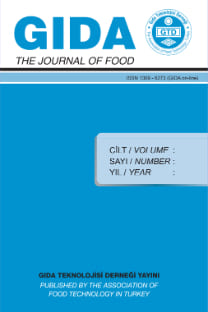Rheological characteristics of traditional salep drink flavored vith cocoa powder
Kakao tozu ile aromatize edilmiş geleneksel salep içeceğinin reolojik özellikleri
___
- 1. Kaya S, Tekin AR. 2001. The effect of salep content on the rheological characteristics of a typical ice-cream mix. J Food Eng, 47: 59-62.
- 2. Tekinsen OC, Karacabey A. 1984. Bazi stabilizatör karişimlarinin kahramanmaras tipi dondurmanin fizik- sel ve organoleptik nitelikleri üzerine etkisi. Tubitak, Proje no: Vhag 594.
- 3. Lecumberri E, Mateos R, Pulido MI, Rupe´rez P, Goya l, Bravo l. 2007. Dietary fibre composition, antioxidant capacity and physico-chemical properties of a fibre-rich product from cocoa (theobroma cocoa l.). Food Chem, 104: 948-954.
- 4. Yang H, Irudayaraj J, Otgonchimeg S, Walsh M. 2004. Rheological study of starch and dairy ingredient-based food systems. Food Chem. 86: 571-578.
- 5. Dogan M, Kayacier A. 2004. Rheological properties of reconstituted hot salep beverage. Int J Food Prop, 7: 683-691.
- 6. Marcotte M, Hoshahili T, Ramaswamy AR. 2001. Rhe- ological properties of selected hydrocolloids as a func- tion of concentration and temperature. Food Res Int, 34: 695-704.
- 7. Genc M, Zorba M, Ova G. 2002. Determination of rheological properties of boza by using physical and sen- sory analysis. J Food Eng, 52: 95-98.
- 8. Köksoy A, Kılıç M. 2003. Effect of water and salt level on rheological properties of ayran, a Turkish yoghurt drink. Int Dairy J, 13: 835-839.
- 9. Alpaslan M, Hayta M. 2002. Rheological and sensory properties of pekmez (grape molasses)/tahin (sesame paste) blends. J Food Eng, 54: 89-93.
- 10. Kayacier A, Karaman S. 2008. Rheological and some physico-chemical characteristics of selected turkish honeys. J Texture Stud, 39: 17-27.
- 11. Cotrell JIL, Geoffrey P, Philips GO. 1980. The effect of stabilizers on the viscosity of an ice-cream mix. J Sci Food Agric, 31: 1066-1070.
- 12. Yanes M, Duran L, Costell E. 2002. Rheological and optical properties of commercial chocolate milk bever- ages J of Food Eng, 51: 229-234.
- 13. SAS. 1988. SAS/STAT User’s Guide (6.03), SAS Insti- tute Inc., Cary, NC.
- 14. Telcioglu A, Kayacier A. 2007. The effect of sweet- eners and milk type on the rheological properties of re- duced calorie salep drink. Afr J Biotechnol, 6: 465-469.
- ISSN: 1300-3070
- Yayın Aralığı: 6
- Başlangıç: 1976
- Yayıncı: Prof. Dr. İbrahim ÇAKIR
Keçiboynuzu Pekmezinin Karakteristiği ve 5-Hidroksimetilfurfural İçeriği (İngilizce)
Nedim TETİK, İrfan TURHAN, Mustafa KARHAN, Hatice Reyhan ÖZİYCİ
Seval Andiç Yusuf TUNÇTÜRK, Hüseyin GENÇCELEP
Mustafa Kürşat DEMİR, Adem ELGÜN, Ahmet AVCİ
Characterization of, and 5-hydroxymethylfurfural concentration in carob pekmez
İrfan TURHAN, Nedim TETİK, Hatice Reyhan ÖZİYCİ, Mustafa KARHAN
Kakao Tozu ile Aromatize Edilmiş Geleneksel Salep İçeceğinin Reolojik Özellikleri (İngilizce)
Gıdaların Muhafazasında Bakteriyosin ve Bakteriyofaj Uygulamaları
A. Kemal SEÇKİN, Emrah BALADURA
Mekanik Ayrılmış Tavuk Etlerinde Donmuş Depolamanın Lipitlerdeki Değişime Etkisi (İngilizce)
Nuray KOLSARICI, Kezban CANDOĞAN, İlker Turan AKOĞLU
Gülden Başyiğit KILIÇ, Aynur Gül KARAHAN
